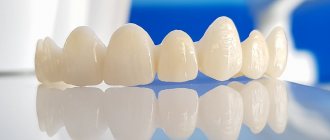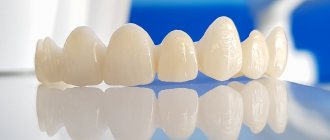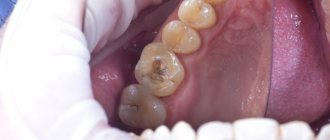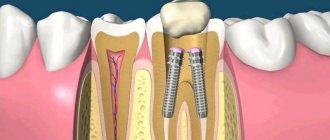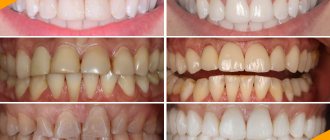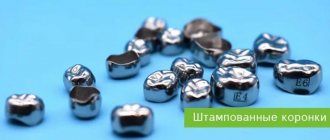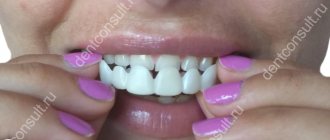A photopolymer filling is a modern filling material based on a composite substance that changes its state of aggregation under the influence of light rays of a certain length. Light composite has a whole range of advantages over traditional analogues, including: increased strength, durability, resistance to pigmentation, comfort of work for the dentist, etc.
After hardening of the photopolymer composite, the filling is reliably connected to natural dental tissues and acquires maximum strength. It is installed in the treatment of a wide range of dental pathologies and is the most popular solution in modern dentistry.
How is a light seal different from a regular one?
In fact, the term “light filling” is more popular among the people, but experts usually use other names: photopolymer, light-curing, heliopolymer are the most common of them. A light filling is a fairly plastic material, and thanks to ultraviolet light it is much easier for a specialist to carry out a filling. This is the main difference between a light filling and a regular one. In addition, you can choose many colors and shades for a light filling, which is why it is so often used in the treatment and restoration of teeth in the smile area. In short, the main advantages of a light filling are reliability, durability and high aesthetics. These qualities make light-based dental fillings one of the most sought after in the dental market.
Charge for regular drinks
It would seem that there is nothing reprehensible in a cup of coffee or tea in the morning, afternoon and evening. Most people have long been accustomed to these liquids, although they appeared in our culture, frankly speaking, relatively recently. One way or another, getting too carried away with them can also lead to yellow teeth. By the way, the type and color of tea does not really matter here. For example, the majority today do not even know how to choose the right green tea, opting for advertised, unnatural varieties with an abundance of artificial coloring substances. Suffice it to say that the popular so-called “milk oolong” is a chemical that the Chinese themselves will never drink.
Composition of the light seal
The vast majority of filling types are based on the use of a mixture of several materials. A filling made from a light-curing composite has a rather complex composition, which is partly why it costs more than its analogues.
Light seal materials
- Heliocomposite.
The basis of a light filling, which under the influence of an ultraviolet lamp breaks down into radicals, due to which polymerization (hardening) of the filling material occurs. - Filler.
This can be silicon dioxide, glass ceramics, etc. The structure, color and area of application of the filling depend on the type of filler. - Connecting elements.
Precautions after filling
After installing a light-curing filling, it is extremely important to follow your dentist’s recommendations for oral care and nutrition during the first time after the procedure. You will be able to eat no earlier than an hour after filling
, food should be neutral in temperature and hardness.
The final polymerization process continues for several more days, so for the next 3–5 days you should refrain from foods and drinks with active pigments: cherries, beets, coffee, pomegranate juice, tomato soups. Such precautions are necessary to maintain the shade of the installed composite.
Types of light seals
Some sources indicate that only anterior teeth can be restored using light-curing composite fillings, but this is incorrect information. Today, such filling is successfully used in all departments, except for the most inaccessible places (for example, “wisdom teeth”). All types of light fillings differ in the composition of the filler, which determines their characteristics.
| Light fillings for teeth | Description | Application area |
| Macro-filled light fillings (light fillings for chewing teeth) | The filler consists of solid large particles (macrophiles). They give the filling strength, but have a rough surface and tend to lose color. | Macrophilic light fillings are usually used on posterior teeth or on the inside of the dentition, where aesthetics are less important. |
| Microfilled light fillings (light fillings for front teeth) | Fillers consisting of small particles. They hold color well, can be polished, but are very fragile. | Mostly used in the smile area. |
| Nanohybrid | They consist of ultra-fine particles that are both durable and aesthetic. | Universal light fillings that can be used in all types of restorations. |
Free consultation
Our specialists will conduct a free consultation and select the best treatment option for you.
Sign up now! Online registration
+7 (495) 649-41-19
Content
1 What is a light seal?
2 What components are included in the photopolymer filling (light filling)?
3 Pros and cons of installing light seals
4 Installation of a light seal, before and after photos:
5 Stages of installing light seals
6 Algorithm for restoration of photopolymer fillings (light fillings)
7 Which light filling is better to choose? 7.1 Light seal Estelite
7.2 Features of the use of Filtek light seals
7.3 Light seal Vitremer “Pros”
7.4 Light seal Revolution
8 How to care for the oral cavity after installing a light filling
9 Price for installing light seals
Installation of a light seal
Today, a light filling can be installed in almost any clinic. Installation has approximately the same number of steps as in the case of other types of fillings (with the exception of scanning with an ultraviolet lamp).
- Initial consultation, panoramic x-ray.
- Anesthesia.
- Preparation of damaged tooth tissues. During depulpation, the canals are treated and a temporary filling is installed.
- Placing a light filling (filling the area with filling material and giving it a primary shape).
- Polymerization of the filling under the influence of ultraviolet light.
- Grinding and finishing of the filling to achieve optimal shape and correct occlusal contact.
If after filling with a light filling your tooth hurts for more than three days or you feel discomfort when closing your jaws, contact your doctor as soon as possible. Find a trusted clinic where you can get a filling in Moscow on Startsmile.ru in the “Search for dentists” section
Advantages and disadvantages of photopolymer fillings
Due to the peculiarities of the composition of composite photopolymer fillings, they have a whole range of advantages that make them the best material for restoring the function and aesthetics of teeth. The main advantages include:
- High quality of fixation on natural dental tissues - withstands strong mechanical loads and is resistant to temperature effects;
- Good plasticity – allows the doctor to effectively fill hard-to-reach areas of the teeth;
- Resistance to pigments – has increased resistance to various dyes, retains the original color for many years;
- Instant drying - the filling dries in a few seconds (under the influence of light rays of a certain spectrum);
- Aesthetic qualities - after treating the surface with special polishing attachments, a specific shine characteristic of natural tooth enamel is achieved.
This filling material has practically no disadvantages in comparison with analogues, with the exception of a higher cost. Therefore, before carrying out the procedure, it is worth checking with the doctor how much a light-curing filling costs in a particular case. Note! The price of a light-curing filling depends on a number of factors: the type of composite, its volume and the complexity of installation.
How much does it cost to install a light seal?
In order to most accurately tell you how much it costs to get a light filling, you need to understand what type of filling will be installed, as well as where exactly the treatment will take place. The cost of a light filling in a state clinic starts from 900 rubles. As a rule, this is a medium quality composite material intended for the restoration of chewing teeth. In private dental clinics in Moscow, the price of a light filling starts from 1,500 – 2,000 rubles. Light fillings for front teeth are more expensive: for aesthetic restorations, the price can exceed 3,000 rubles.
How to install a photopolymer filling
The installation of a photopolymer filling is carried out in an equipped dental office, in several key stages:
- Initial appointment – the doctor examines the patient’s oral cavity, assesses the current condition of the teeth, and decides on the need for filling;
- Damaged tissue is removed - a comprehensive cleaning of the area is carried out for the subsequent installation of a filling;
- Selecting the color of the material – the filling material is selected according to a special scale; it must match the color of the natural enamel of the patient’s other teeth;
- Preparing the tooth for filling - the cleaned tooth is dried and treated with special compounds to improve the quality of adhesion to the polymer;
- Installing a filling - the doctor gradually applies a photopolymer composition into the space to be filled, securing each layer with ultraviolet exposure;
- Treatment of a hardened filling - the anatomical shape is adjusted, the bite is restored and the surface is polished.
The installed photopolymer filling does not require special care. Moreover, in the first days after installation, doctors recommend refraining from drinking staining water and food, and also reducing the mechanical load on the area of the installed filling during eating. Answering the question: after installing a light-curing filling, how long after can you eat? Experts note that a full meal can be taken 2-3 hours after the procedure.
Duration of operation
The service life of this filling is determined individually for each patient, since it depends on many additional factors. According to dentists, the average service life of a light filling is determined from three to five years.
Attention! A light filling, to the extent that its composition is safe, can be installed on pregnant women. However, filling should be considered only after three months of pregnancy.
Useful and harmful foods for teeth
There are a number of reasons that can either shorten or extend the service life of the filling. First of all, the safety of the filling will directly depend on hygiene procedures and the correctness of their implementation for patients. The nutritional factor is also important; you must not forget about the list of products that have the necessary vitamin and mineral complexes for dental health. Lovers of sweets and baked goods should remember that consuming these products significantly shortens the service life of the light seal.
Teeth whitening technology
As you may have noticed, in each unique case, it is necessary to look for a unique approach. But we can make a generalization about the technological process of professional teeth whitening! Firstly, professional cleaning is necessary to get rid of caries and other diseases. Secondly, it is necessary to decide on the location of the seals and select the necessary tactics of action. Thirdly - whiten the enamel! And, finally, insert new, lighter fillings, or veneers.
We think that now you will not have any questions about whether it is possible to whiten teeth with a filling. Modern technologies allow every person to have a snow-white smile, regardless of the specific situation and conditions. Smile so that people around you admire your smile. In fact, you will also be delighted with your snow-white teeth if you contact our clinic.
Why did the tooth suddenly turn yellow? What to do if a tooth turns yellow?
The oral cavity is rich in various bacteria that harm the only organ in a person that does not recover at all; if the liver and skin can regenerate, then neither tooth enamel nor the tooth itself can be restored with the help of therapeutic treatment. Therefore, you need to take care of your teeth from childhood, and adopt this habit in adulthood, otherwise problems cannot be avoided. Of course, there is help from a dentist who will restore the integrity of the tooth with fillings or prosthetics, but this is not the same, it is expensive, and leads to constant examination and reconstruction in the same dental clinic.
Why did the tooth turn yellow?
Most often, people have a question about why a tooth suddenly turned yellow . There can be a lot of reasons. Not only adults, but also children are susceptible to this. No one is immune from yellowing of teeth, the appearance of plaque, destruction of enamel, caries, and, as a result, tooth extraction. . In childhood, this may be a consequence of the use of antibiotics or other strong drugs that destroy not only the intestinal microflora, but also the entire microflora of the digestive tract. The oral cavity also applies to this, because in just a few days irreversible changes can occur in the teeth, which will then be impossible to restore to their original state.
What to do if a child’s tooth turns yellow?
If a child's tooth suddenly turns yellow , you should immediately seek help from a good dentist who can stop the inflammatory process. If the enamel of the tooth has not completely collapsed, then by using rinses and applying lotions from medicinal ointments and solutions, it is still possible to restore yellowed teeth. However, it is worth considering that if the first symptoms appear, it means that they will continue to appear, so the child needs to be shown to the doctor more often in order to carry out the necessary treatment at the first danger. For children who are still very small and cannot tolerate having their teeth drilled, and to whom it is simply impossible to explain that pain must be endured, there is a method of silvering. This method allows you to protect the tooth from developing caries; such an operation should be performed at least four times a year to stop the process of tooth decay until the baby teeth fall out and molars grow in their place.
Why does an adult's tooth turn yellow?
In an adult, if a tooth suddenly turns yellow, there may be many more reasons; perhaps this is a manifestation of an old injury received in childhood, when the integrity of the tooth was damaged, but due to the strong root it did not fall out, but grew firmly in place. This happens very often: the tooth dies, but does not fall out, it does not hurt, does not cause any inconvenience, but at a certain moment it can suddenly change color, from yellow to black.
Also, a tooth can change its color due to aging, which is almost impossible to stop, because of illness, because of the same antibiotics, there can be many reasons, but the consequence is always the same - contact a dentist. A good specialist will find the cause by taking an X-ray of the tooth and prescribe the necessary treatment, which may be able to restore the natural color of the teeth. This could be whitening, stone removal, or internal tooth whitening, which began to be used in medical practice quite recently. However, it is better to have healthy teeth and a beautiful smile, and not to treat them, and for this you need to take care of them and regularly go for preventive examinations to the dentist.
26.01.2013 12:22
